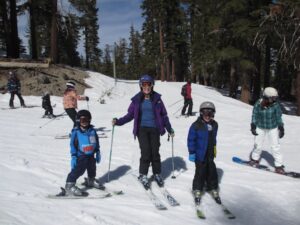Enjoying Allergy and Asthma Season…Yes, there is a way!
By Tanya Remer Altmann, MD and Candace Remer, MD
Asthma is the most common chronic childhood illness, causing almost 2 million emergency room visits and more than 5,000 deaths each year. Allergies affect millions of children and if untreated, interfere with concentration, decrease school performance and make them more susceptible to sinus and ear infections. Don’t let springtime worsen your child’s allergies and asthma and prevent your child from running outside and enjoying life. Take control – and prevent symptoms before they start.
Allergic Rhinitis
Itchy and runny noses, sniffling, frequent sneezing and rubbing the nose, itchy eyes and trouble breathing through the nose are all symptoms of allergic rhinitis. Triggers include grasses, trees and weed pollens (hayfever), cats, dogs and dust mites. Untreated, nasal allergies not only make your child feel miserable but can impede school performance, increase risk of infections and lead to asthma attacks.
Start treating her symptoms now! First-line treatment for allergic rhinitis is a nasal steroid spray (e.g. Nasonex, Flonase, Rhinocort, Veramyst) used daily. If you can get your kids to use them every day, persistent symptoms can be prevented.
Another preventative option is a Leukotriene inhibitor (e.g. Singulair) taken nightly. For quick relief, an antihistamine will help or even prevent the symptoms if taken 1 hour before they may occur. And newer forms of antihistamines (e.g. Claritin, Allegra, Clarinex, Xyzal) won’t turn your children into zombies.
The nose isn’t the only victim of spring! The lungs are also affected by the same allergens.
Asthma
Does coughing or trouble breathing make your child stop and rest during his soccer game? If so, he may have asthma. Asthma is the most common chronic childhood illness. It affects more than 17 million Americans each year–5 million are children.
Attacks of wheezing, shortness of breath, coughing and chest tightness (even occasionally) may be signs of asthma. Exercise, exposure to cold air, cockroaches, molds and everything that triggers allergic rhinitis also may trigger asthma. Don’t smoke! Cigarette smoke is one of the worst triggers of asthma.
To control your child’s asthma, you must know how to treat an acute asthma attack and prevent future attacks. Albuterol (e.g. Proventil, Proair,Ventolin) inhaler is a RESCUE medicine—it relieves acute asthma symptoms by opening up the airways. It does NOT affect the progression of the disease—chronic inflammation and damage of the airways.
If your child uses a rescue medication more than 2 times a week, wakes up in the middle of the night more than twice a month, or can’t participate in daily activities or sports, see your child’s physician for new treatment options. Your child may need a long-term controller medication to treat lung inflammation and prevent future asthma attacks.
Long-term controller medications include inhaled steroids (eg. Pulmicort, Flovent, QVAR) and/or a leukotriene inhibitor (e.g. Singulair). If your child is appropriately using one of these medications and still needs Albuterol more than two times a week, a long acting Albuterol (e.g. Serevent) or combination inhaled steroid and Serevent (e.g. Advair, Symbicort) is another option. You should discuss the symptoms with your doctor before making any changes in your child’s medications.
Treating hayfever’s drippy nose as previously discussed has been shown to improve asthma in children who have both allergic rhinitis and asthma—as many as 78% of asthma patients also have nasal allergies.
Asthma and allergies should not interfere with your child’s life. With education and new treatment choices such as long-term controller medications, your child can run, play, sleep soundly, do well in school and enjoy springtime.
Dr. Candace Remer is an Allergy/Immunology specialist at Kaiser in Northern California
”





